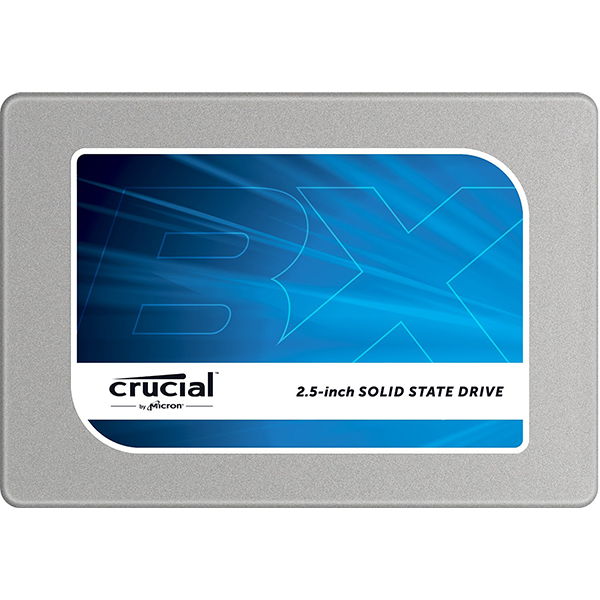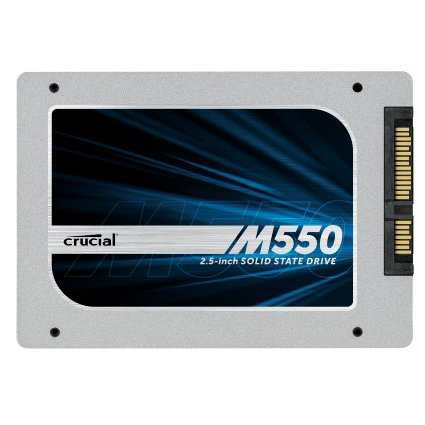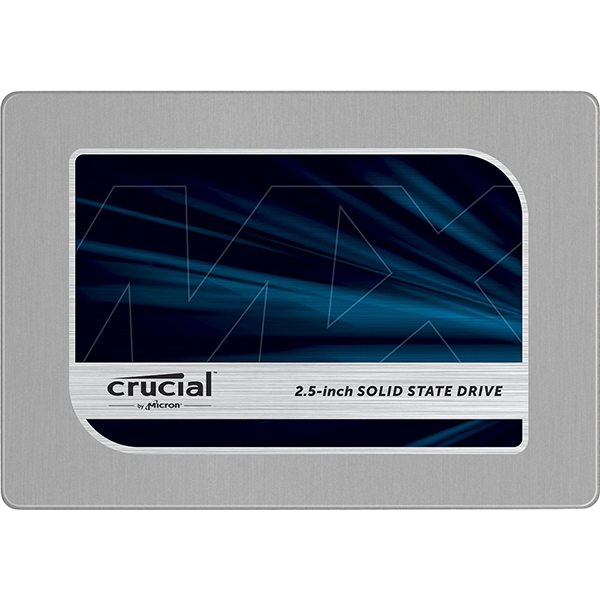OCZ Vector 180 960GB SSD Review
Why you can trust Tom's Hardware
Four-Corner Performance Testing
The table below contains the comparison units for today's review:
To read about our storage tests in-depth, please check out How We Test HDDs And SSDs. Four-corner testing is covered on page six.
Sequential Read Performance
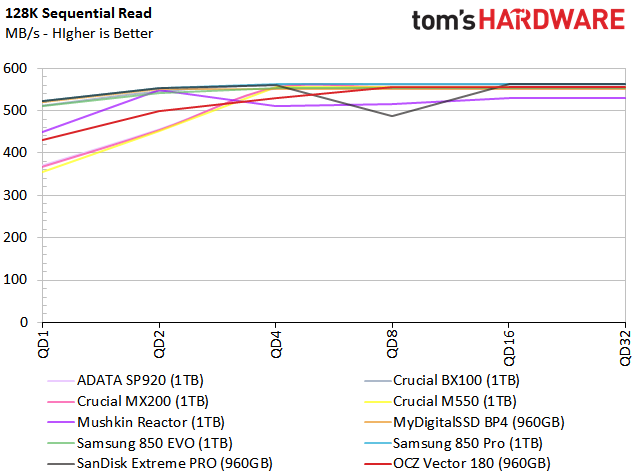
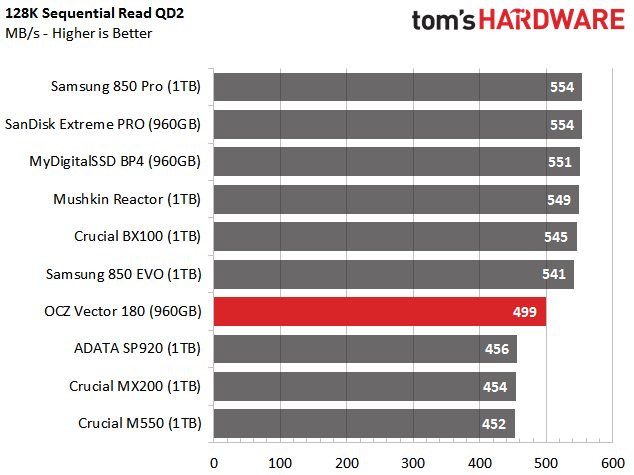
The Vector 180 960GB starts off with a sequential read rate just over 420 MB/s at a queue depth of one. Remember that these results follow a conditioning pass, so the numbers are lower than OCZ's claims. Once eight commands are queued up, the Vector 180 is running at full speed, limited by the SATA interface.
We measure sequential read performance at a queue depth of two. There, the Vector 180 960GB delivers 500 MB/s, which is respectable. However, that's less than many other high-end drives.
Sequential Write Performance
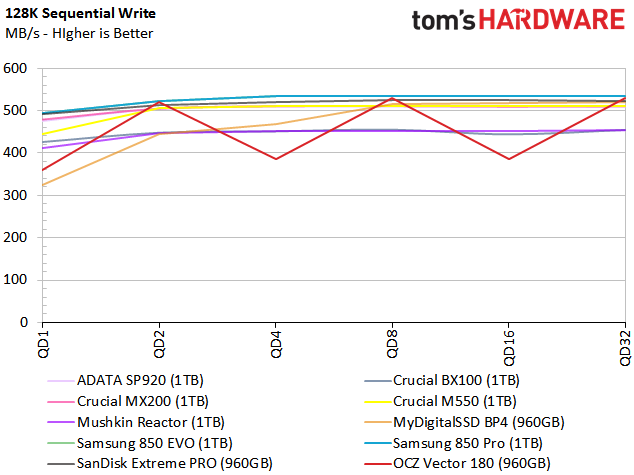
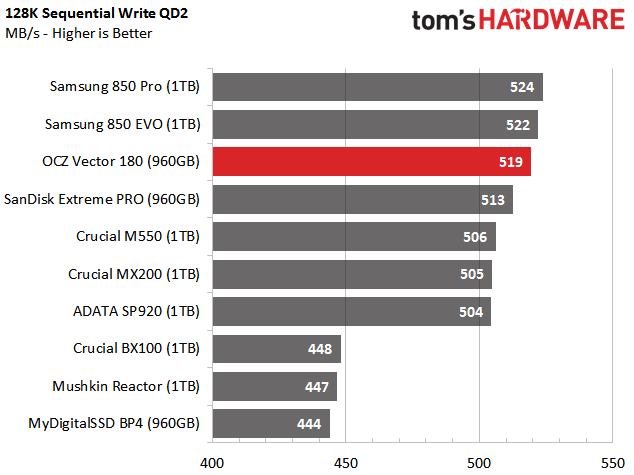
Our sequential write performance results show a wave pattern that's the result of conditioning. There are some other write issues we'll explore on the next page.
A result of nearly 520 MB/s puts the Vector 180 just under Samsung's 850 with TurboWrite technology from an SLC cache layer.
Random Read Performance
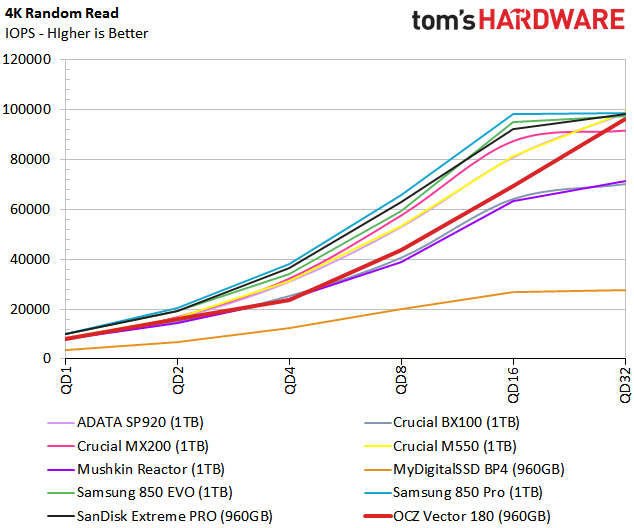
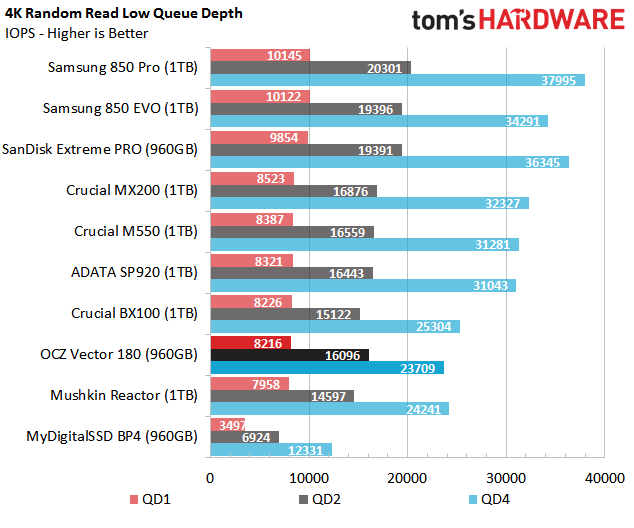
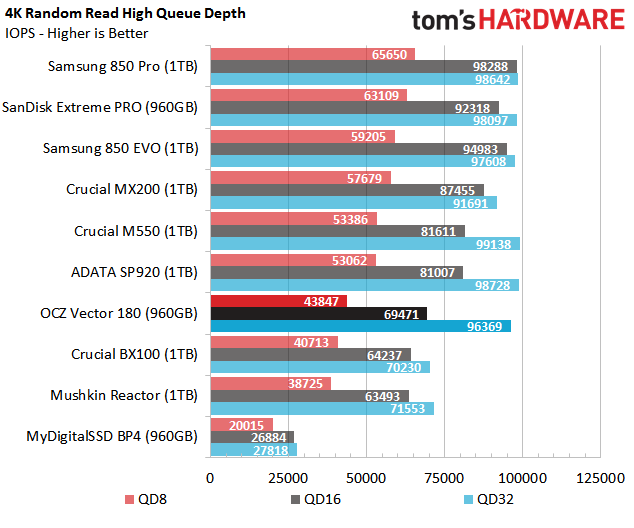
The Vector 180's random read performance is lower than several competing products, at least until OCZ's latest offering is presented with deeper queues. There, random reads catch up to the rest of the field, limited by SATA 6Gb/s. Down low is where we need to focus though; that's more reflective of real-world performance.
Get Tom's Hardware's best news and in-depth reviews, straight to your inbox.
The Barefoot 3 controller is starting to show its age, unable to deliver 10,000 random read IOPS at a queue depth of one, and trailing significantly at a queue depth of four. With 32 outstanding commands, though, OCZ can claim 100,000 random read IOPS like many of the others.
Random Write Performance
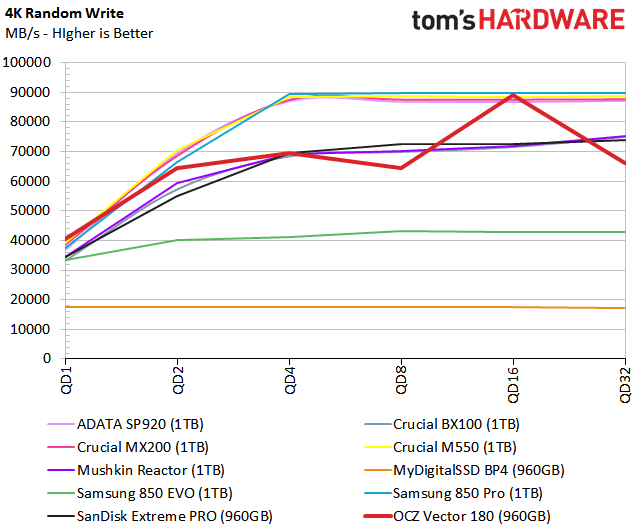
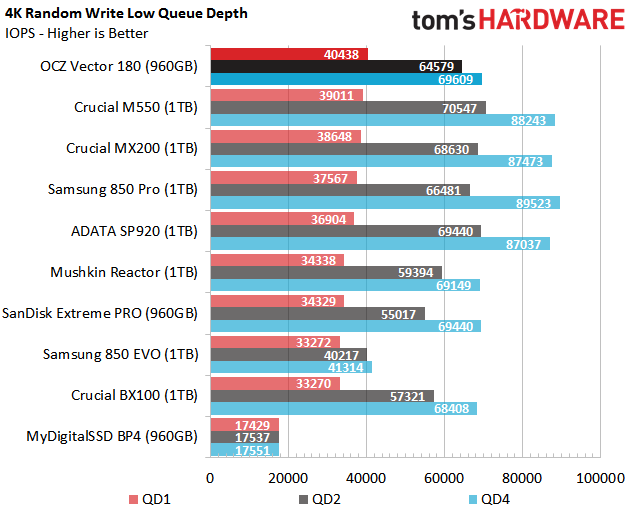
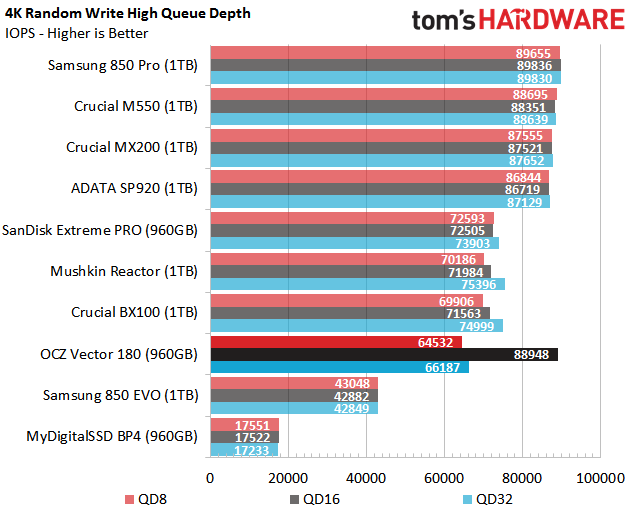
Random write performance is all over the place in our conditioned environment. On the next page, we'll explain in greater detail why the Vector 180's buffer flush causes so many issues with our testing and your real-world experience.
The Vector family is known for its alacrity in low queue depth, random write performance. This advantage remains at a queue depth of one. But at a queue depth of two, other products already surpass the Vector 180's best effort. OCZ does manage to hit the 90,000 random write IOPS its spec sheet claims. That level of performance comes at a queue depth of 16 in our testing, though, as you can see, the IOPS roll back further up the scale.
Current page: Four-Corner Performance Testing
Prev Page A Closer Look At The Vector 180 Next Page Mixed Workload And Steady State Testing
Chris Ramseyer was a senior contributing editor for Tom's Hardware. He tested and reviewed consumer storage.
-
damric Now that's what I'm talking about. Adding the capacitor should keep them from having so many RMAs from loss of power/hard resets. I usually only see the capacitor added to enterprise solutions, so I'm excited to see it as a feature in consumer SSDs.Reply
THW, you need to test all SSDs with about 50 of these hard power loss cycles and see which ones become unresponsive to motherboards and bricked. -
PraxGTI Intel has been doing this on consumer drives for reliability for a long time. OCZ cuts corners. From unstable DDR3 RAM to unreliable Vertex SSDs (Red light, bricked, within weeks of initial use), I for one won't buy OCZ products anymore without big warranties and longer-term support. I have never had an issue with an Intel drive, totally worth the extra money and reliable performance.Reply -
uglyduckling81 I thought OCZ was gone. I have had 2 of their drives and never had a problem. The only reason I'm not still using my original Agility is because my laptop got stolen, but I'm sure someone is still enjoying the speed it offered. That thing cost over AU$500 for 128gb but it was worth every cent.Reply -
I have two OCZ drives, with Terabytes written to them and no problems at all. The problems seem mostly hearsay or people that don't know how to read SMART data. One has 19 TB of writes (my vertex 3 doesn't show writes, but I'd estimate it's around that or higher). Both have around 19 000 hours of heavy use.Reply
That being said, with 3d NAND available, it just doesn't make sense to purchase anything except Samsung drives these days. I'm just waiting for prices to come down, and nvme.
But OCZ is very reliable, don't drink the kool-aid. -
ykki Hopefully this move (adding the capacitor) will also encourage(force?) other players in the market to follow suit.Reply -
damric Reply15546008 said:I have two OCZ drives, with Terabytes written to them and no problems at all. The problems seem mostly hearsay or people that don't know how to read SMART data. One has 19 TB of writes (my vertex 3 doesn't show writes, but I'd estimate it's around that or higher). Both have around 19 000 hours of heavy use.
That being said, with 3d NAND available, it just doesn't make sense to purchase anything except Samsung drives these days. I'm just waiting for prices to come down, and nvme.
But OCZ is very reliable, don't drink the kool-aid.
Out of 6 of my OCZ drives, 5 of them bricked after hard reset or power loss. I was able to raise my Agility 2 back from the dead though. Since then I've learned my lesson and I don't do heavy overclocking tuning/testing/benching on SSD to minimize crashes.
I've had other SSDs with same problem. It's most common on Sandforce, but I see it happen to Indillix and Micron controllers as well. -
David Cruit Wait. Forced shut downs screw up SSDs? I overclock a lot and I've done at least 100 forced shut downs, and my SanDisk Extremes (I not II) are still working as good as ever.Reply -
Reply15546281 said:15546008 said:I have two OCZ drives, with Terabytes written to them and no problems at all. The problems seem mostly hearsay or people that don't know how to read SMART data. One has 19 TB of writes (my vertex 3 doesn't show writes, but I'd estimate it's around that or higher). Both have around 19 000 hours of heavy use.
That being said, with 3d NAND available, it just doesn't make sense to purchase anything except Samsung drives these days. I'm just waiting for prices to come down, and nvme.
But OCZ is very reliable, don't drink the kool-aid.
Out of 6 of my OCZ drives, 5 of them bricked after hard reset or power loss. I was able to raise my Agility 2 back from the dead though. Since then I've learned my lesson and I don't do heavy overclocking tuning/testing/benching on SSD to minimize crashes.
I've had other SSDs with same problem. It's most common on Sandforce, but I see it happen to Indillix and Micron controllers as well.
Sounds like BS. You have 6 OCZ SSD? Let me guess, you have 30 TB of precious data and 196GB of ram. But no UPS?
I'll admit, I've never used their agility drives, I went with Vertex both times, 3 and 4.
Sorry if I sounded harsh, it's just your bash against OCZ sounds like every other (invented) one. How many people buy 6 drives? And why buy 6 SSD drives? And you have many other SSD drives, many of which went bad, with both Indillix and Micron controllers. It doesn't make sense.
If you work for a corporation, you have UPS and redundant power supplies. If you're an individual, you can't have had so much experience with so many hard-drives. So you're a liar. Like so many a-holes online that try to discredit OCZ. Everyone I know that has used OCZ has had great experience, except for early drivers that did cause problems, mostly lost data, rarely lost drives. -
NeatOman Corsair, Samsung, Sandisk, Intel.. the rest i don't care for, not worth taking a risk if a new generation is good or not. Those companies have a great reputation of only selling SSD's that are dependable. If its in a desktop and you don't have an UPS then look for a PFM, but IMO you shouldn't half ass it as it will still lose data because it wont write what is still in the RAM. It's only $40, and should be replaced every two years.Reply -
damric Reply15546723 said:15546281 said:15546008 said:I have two OCZ drives, with Terabytes written to them and no problems at all. The problems seem mostly hearsay or people that don't know how to read SMART data. One has 19 TB of writes (my vertex 3 doesn't show writes, but I'd estimate it's around that or higher). Both have around 19 000 hours of heavy use.
That being said, with 3d NAND available, it just doesn't make sense to purchase anything except Samsung drives these days. I'm just waiting for prices to come down, and nvme.
But OCZ is very reliable, don't drink the kool-aid.
Out of 6 of my OCZ drives, 5 of them bricked after hard reset or power loss. I was able to raise my Agility 2 back from the dead though. Since then I've learned my lesson and I don't do heavy overclocking tuning/testing/benching on SSD to minimize crashes.
I've had other SSDs with same problem. It's most common on Sandforce, but I see it happen to Indillix and Micron controllers as well.
Sounds like BS. You have 6 OCZ SSD? Let me guess, you have 30 TB of precious data and 196GB of ram. But no UPS?
I'll admit, I've never used their agility drives, I went with Vertex both times, 3 and 4.
Sorry if I sounded harsh, it's just your bash against OCZ sounds like every other (invented) one. How many people buy 6 drives? And why buy 6 SSD drives? And you have many other SSD drives, many of which went bad, with both Indillix and Micron controllers. It doesn't make sense.
If you work for a corporation, you have UPS and redundant power supplies. If you're an individual, you can't have had so much experience with so many hard-drives. So you're a liar. Like so many a-holes online that try to discredit OCZ. Everyone I know that has used OCZ has had great experience, except for early drivers that did cause problems, mostly lost data, rarely lost drives.
I had an Agility 2 (failed), Agility 3 (failed), 3 Vectors (all failed) (2 came from RMA), and 1 Vector 150 (still in use), I also have a PNY Optima (first one failed), and an m500. I'm on a first name basis with the OCZ techs, btw. They always do me good when it comes to RMA, despite the fact that I broke a lot of drives. They pay for all my shipping now, and upgraded my last Vector to the 150 which is still going strong despite the fact that I haven't been all that careful with it.
I test a lot of hardware in my lab, but I'm only a small time overclocker/bencher. I really don't own that much compared to a lot of the people around here. I only have 4x entry/mid-level gaming rigs up and running right now at the house.
You can check out my HWBOT profile and see the dozens of hardware submissions I have made over the years, if you still have doubt about my credentials, or just ask the mods around here.
